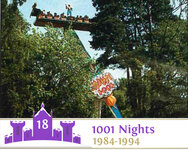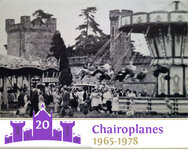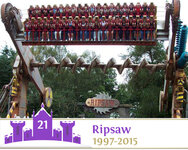Squiggs
TS Team
By 1995, Alton Towers was well on the way to becoming the theme park we know today and Tussauds had got into the swing of adding a range of different ride types to keep the line-up varied yet balanced.
Energizer was one of their first major flat ride additions, adding a new spark into Festival Park before moving over to X-Sector in 1998. In its final years in the park, it got a family-friendly, prehistoric makeover to become Bone Shaker in Ug Land.
It is now over 20 years since Bone Shaker last operated at Alton Towers, but today the ride can be found at Terra Mitica where it is known as La Cólera de Akiles

Energizer was one of their first major flat ride additions, adding a new spark into Festival Park before moving over to X-Sector in 1998. In its final years in the park, it got a family-friendly, prehistoric makeover to become Bone Shaker in Ug Land.
It is now over 20 years since Bone Shaker last operated at Alton Towers, but today the ride can be found at Terra Mitica where it is known as La Cólera de Akiles











